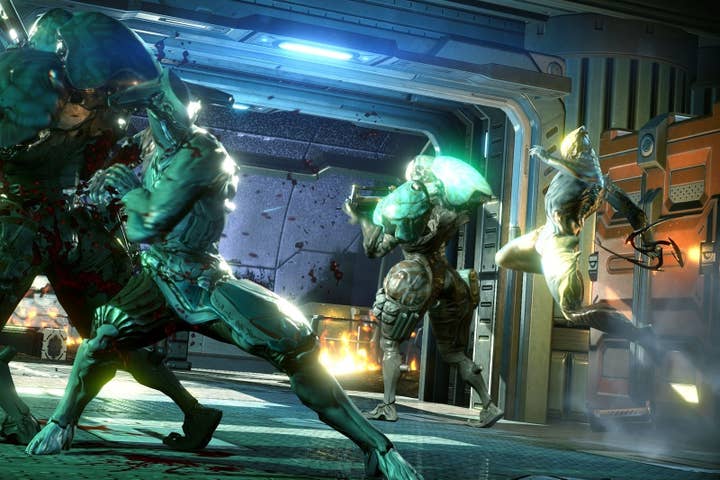Warframe dev: Mid-size studios dying off
Digital Extremes wants to stay one anyway, creative director says mobile is even riskier than free-to-play
In 2004, just as the industry was heading into its last console transition, London, Ontario-based Digital Extremes went out on a limb with Dark Sector, a next-gen game based on its own original intellectual property. The game struggled upon release in 2008, and the studio resorted to doing work-for-hire gigs to keep the lights on. Now with another console transition on the way, the studio is ready to go out on a limb with its own IP once more, the free-to-play third-person cooperative shooter Warframe. Already in open beta on the PC, the game has also been confirmed as a PlayStation 4 launch title.
GamesIndustry International spoke with Digital Extremes creative director Steve Sinclair (no relation) last week at E3 to discuss Waframe, the mid-size studio's gameplan, and the pressure to leave consoles for the increasingly popular mobile and tablet space. While Sinclair said the studio was confident about Warframe's success, he acknowledged that wasn't always the case.
"I suppose internally over the last few years we've had a lot of the team ask why we aren't making a tablet game, or why aren't we making phone games," Sinclair said. "It seems like it's feast or famine there, and the team sizes are much smaller than ours. And we wanted to keep the people we had. If you want to get two or three guys and take a shot at mobile, it's probably awesome for you. But for a mid-size developer like us, it's even riskier than going free-to-play."
Sinclair said that risk weighed on the studio. Warframe was an experiment, and Digital Extremes had no first-hand experience with monetization before. It was just as recently as March, when the open beta for the game launched on Steam and made the store's top 10 list, that the decision started to receive clear validation. Digital Extremes hadn't been planning on a console version of the game, but the buzz from the beta had caught Sony's interest.
"Internally, the studio was sharply divided on what we were doing"
Steve Sinclair
"They approached us, and they've been really, really good to us, helping us get more dev kits than they wanted to give us," Sinclair said. "They definitely squeezed themselves for us and the fact they put us up [in their E3 booths] three months after they sent us dev kits has been awesome for us. And it's given us a chance to expose the game to people that maybe weren't as interested in it when it was just PC free-to-play, because there's that certain stigma surrounding that."
And it's not just the support of Sony that's made a difference. Sinclair said the company also learned a bit from its experience with Dark Sector and how much of the operation beyond the game itself was beyond Digital Extremes' control.
"We're a piece in the puzzle when that's happening," Sinclair said. "The difference with Warframe is we hired customer support representatives. We hired marketing people. We hired people who speak different languages so our Russian players, and our Japanese players, and our German players can have people talking to them on our forums. We are taking responsibility for the game from top to bottom."
Still, Sinclair said the studio had been waiting for the other shoe to drop for some time, and it was only weeks ago when they became convinced that hitching the company's fate to Warframe was the right call.

"Internally, the studio was sharply divided on what we were doing," Sinclair said. "Because we had worked and tried to do frankly high budget looking stuff for way less money. You get a call from an executive saying he just saw that Halo trailer and why don't we have X,Y, and Z? And they don't take kindly to, 'Well, we're talking about budgets with extra zeroes to them.'"
"Most of us are dead and gone, and the quadrupling down on a few franchises means that a mid-size developer like us that can't throw 500 people on a single project don't have any work"
Steve Sinclair
The Warframe team began with 30 developers, but as it has gained momentum and other projects have wrapped up, Digital Extremes has been moving more of its 200-strong staff to work on the shooter. Even though with Warframe, Digital Extremes has a chance to thrive like never before in the company's history, Sinclair said he's keenly felt the pressures that have put so many mid-size developers out of business in recent years.
"Massively harder," Sinclair said when asked if it's any easier for mid-size studios these days. "Ridiculously harder. Most of us are dead and gone, and the quadrupling down on a few franchises means that a mid-size developer like us that can't throw 500 people on a single project don't have any work. So this game has given us a new lease on life."
But even if Warframe turns out to be a smash hit for the company, Sinclair said Digital Extremes would continue carving out its path as a mid-size developer.
"I don't like huge huge teams," he explained. "It takes some of the fun and spontaneity out of the job. It gets mired in process and bureaucracy and people are able to distance themselves more from the projects. And the great thing about Warframe is to see individuals making massive differences to players and getting instant feedback from the community. That's still very gratifying to keep the team as small as possible."

